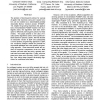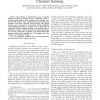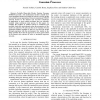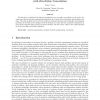288 search results - page 12 / 58 » Risk-averse dynamic programming for Markov decision processe... |
119
click to vote
IJCAI
2003
15 years 2 months ago
2003
The problem of deriving joint policies for a group of agents that maximize some joint reward function can be modeled as a decentralized partially observable Markov decision proces...
103
click to vote
TSP
2008
15 years 1 months ago
2008
The problem of opportunistic access of parallel channels occupied by primary users is considered. Under a continuous-time Markov chain modeling of the channel occupancy by the prim...
133
click to vote
IROS
2009
IEEE
15 years 8 months ago
2009
IEEE
— Partially Observable Markov Decision Processes (POMDPs) provide a rich mathematical model to handle realworld sequential decision processes but require a known model to be solv...
140
click to vote
AOR
2010
14 years 10 months ago
2010
We show how a technique from signal processing known as zero-delay convolution can be used to develop more efficient dynamic programming algorithms for a broad class of stochastic...
108
click to vote
AAAI
1997
15 years 2 months ago
1997
Markov Decision Processes (MDPs), currently a popular method for modeling and solving decision theoretic planning problems, are limited by the Markovian assumption: rewards and dy...




